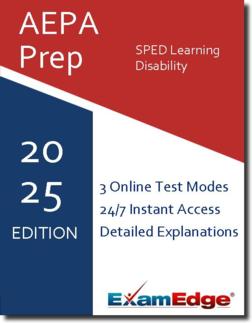AEPA Special Education Learning Disability (27) Practice Tests & Test Prep by Exam Edge - Test Reviews
Based on 25 Reviews
- Real Exam Simulation: Timed questions and matching content build comfort for your AEPA SPED Learning Disability test day.
- Instant, 24/7 Access: Web-based AEPA Special Education Learning Disability practice exams with no software needed.
- Clear Explanations: Step-by-step answers and explanations for your AEPA exam to strengthen understanding.
- Boosted Confidence: Reduces anxiety and improves test-taking skills to ace your AEPA Special Education Learning Disability (27).

AEPA Special Education Learning Disability (27) Practice Tests & Test Prep by Exam Edge - Review
AEPA Special Education Learning Disability - Reviews
Excellent
Based on
125
reviews
“ I passed my AEPA Basic Skills Math subtest today! This was the second time I took the test. My first time I scored 232. This time I scored 244. Taking your practice tests helped me a great deal, because several types of questions on the real test were also on your practice tests. Thanks so mu ...
Read More
Lakisha F, Arizona
“ I am disappointed in this service. I purchased the 15 tests to help me prepare for the second time taking the test and it did not help. The questions were not like what I experienced on the real test and the performance question was completely different and I don't feel prepared me. I would not p ...
Read More
Lesley , Clarkdale, Arizona
See why our users from 154 countries love us for their exam prep! Including 25 reviews for the AEPA SPED Learning Disability exam.
Exam Edge is an Industry Leader in Online Test Prep. We work with our Institutional Partners to offer a wide array of practice tests that will help you prepare for your big exam. No Matter how niche field of interest might be, were here to help you prepare for your test day.
| 2.8M | 4.5M | |
| Users | Tests Taken | |
| 100K | 19 | |
| Unique Exams | Years in Business | |


